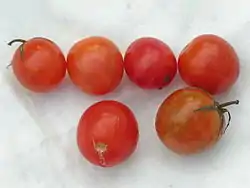tomāts
See also: tomats
Latvian

Tomāti (2)

Tomāts (1)
Etymology
Borrowed from German Tomate, or from Russian томат (tomát), themselves borrowings from French tomate, itself a borrowing from Spanish tomate, ultimately borrowed from Classical Nahuatl tomatl. This word is first mentioned in Latvian by the end of the 19th century, initially in two forms, masculine (tomāts) and feminine (tomāte); only in the 1920s did the masculine form became dominant.[1]
Noun
tomāts m (1st declension)
- tomato (plant (Solanum lycopersicum) with branched stems, yellow flowers and juicy, edible red fruits)
- tomātu stādi ― tomato plants
- ēdamais, kultīvētais tomāts ― edible, cultivated tomato (plant)
- plaši izplatīts kultūraugs ir tomāti, kuri Eiropā ievesti 1554. gadā ― tomatoes are a quite widespread crop, which was introduced in Europe in 1554
- tomātus ilgu laiku audzēja kā dekoratīvus augus ― tomatoes were grown for a long time as ornamental plants
- tomato (the red fruit of this plant, eaten as a vegetable)
- tomātu sula ― tomato juice
- tomātu pasta ― tomato paste
- tomātu biezenis ― tomato puree
- konservēti tomāti ― canned tomatoes
- reņģes tomātu mērcē ― herring in tomato sauce
- brokastīs māmiņa sagriež lielu, sarkanu tomātu un vienu sīpolu ― for breakfast, mummy cut a large, red tomato and one onion
Declension
Declension of tomāts (1st declension)
| singular (vienskaitlis) | plural (daudzskaitlis) | |
|---|---|---|
| nominative (nominatīvs) | tomāts | tomāti |
| accusative (akuzatīvs) | tomātu | tomātus |
| genitive (ģenitīvs) | tomāta | tomātu |
| dative (datīvs) | tomātam | tomātiem |
| instrumental (instrumentālis) | tomātu | tomātiem |
| locative (lokatīvs) | tomātā | tomātos |
| vocative (vokatīvs) | tomāts | tomāti |
Derived terms
References
- Karulis, Konstantīns (1992), “tomāts”, in Latviešu Etimoloģijas Vārdnīca (in Latvian), Rīga: AVOTS, →ISBN
This article is issued from Wiktionary. The text is licensed under Creative Commons - Attribution - Sharealike. Additional terms may apply for the media files.